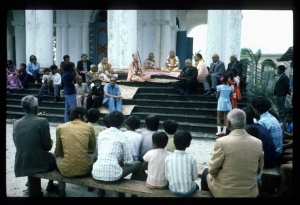CC Madhya 21.90 (1975): Difference between revisions
(Vanibot #0027: CCMirror - Mirror CC's 1996 edition to form a basis for 1975) |
(Vanibot #0020: VersionCompareLinker - added a link to the Version Compare feature) |
||
| Line 2: | Line 2: | ||
<div style="float:left">'''[[Sri Caitanya-caritamrta (1975)|Śrī Caitanya-caritāmṛta (1975)]] - [[CC Madhya (1975)|Madhya-līlā]] - [[CC Madhya 21 (1975)|Chapter 21: The Opulence and Sweetness of Lord Śrī Kṛṣṇa]]'''</div> | <div style="float:left">'''[[Sri Caitanya-caritamrta (1975)|Śrī Caitanya-caritāmṛta (1975)]] - [[CC Madhya (1975)|Madhya-līlā]] - [[CC Madhya 21 (1975)|Chapter 21: The Opulence and Sweetness of Lord Śrī Kṛṣṇa]]'''</div> | ||
<div style="float:right">[[File:Go-previous.png|link=CC Madhya 21.89 (1975)|Madhya-līlā 21.89]] '''[[CC Madhya 21.89 (1975)|Madhya-līlā 21.89]] - [[CC Madhya 21.91 (1975)|Madhya-līlā 21.91]]''' [[File:Go-next.png|link=CC Madhya 21.91 (1975)|Madhya-līlā 21.91]]</div> | <div style="float:right">[[File:Go-previous.png|link=CC Madhya 21.89 (1975)|Madhya-līlā 21.89]] '''[[CC Madhya 21.89 (1975)|Madhya-līlā 21.89]] - [[CC Madhya 21.91 (1975)|Madhya-līlā 21.91]]''' [[File:Go-next.png|link=CC Madhya 21.91 (1975)|Madhya-līlā 21.91]]</div> | ||
{{CompareVersions|CC|Madhya 21.90|CC 1975|CC 1996}} | |||
{{RandomImage}} | {{RandomImage}} | ||
==== TEXT 90 ==== | ==== TEXT 90 ==== | ||
<div class="verse"> | <div class="verse"> | ||
: | :'tryadhīśvara'-śabdera artha 'gūḍha' āra haya | ||
: | :'tri'-śabde kṛṣṇera tina loka kaya | ||
</div> | </div> | ||
| Line 18: | Line 17: | ||
<div class="synonyms"> | <div class="synonyms"> | ||
tri- | tri-adhīśvara—tryadhīśvara; śabdera—of the word; artha—a meaning; gūḍha—confidential; āra—another; haya—there is; tri-śabde—by the word "three"; kṛṣṇera—of Kṛṣṇa; tina loka kaya—the three places or properties of Lord Kṛṣṇa. | ||
</div> | </div> | ||
| Line 25: | Line 24: | ||
<div class="translation"> | <div class="translation"> | ||
"There is a very deep meaning in the word tryadhīśvara, which indicates that Kṛṣṇa possesses three different lokas, or natures. | |||
</div> | </div> | ||
| Line 32: | Line 31: | ||
<div class="purport"> | <div class="purport"> | ||
The word | The word tryadhīśvara means "proprietor of the three worlds." There are three worlds of which Kṛṣṇa is the supreme proprietor. This is explained in Bhagavad-gītā: | ||
:bhoktāraṁ yajña-tapasāṁ | |||
sarva-loka-maheśvaram | |||
:suhṛdaṁ sarva-bhūtānāṁ | |||
:jñātvā māṁ śāntim ṛcchati | |||
"The sages, knowing Me as the ultimate purpose of all sacrifices and austerities, the Supreme Lord of all planets and demigods and the benefactor and well-wisher of all living entities, attain peace from the pangs of material miseries." ([[BG 5.29 (1972)|Bg. 5.29]]) | |||
The word sarva-loka means "all three worlds," and the word maheśvara means "the supreme proprietor." Kṛṣṇa is the proprietor of both material and spiritual worlds. The spiritual world is divided into two portions-Goloka Vṛndāvana and the Vaikuṇṭhas. The material world is a combination of universes unlimited in number. | |||
The word sarva-loka means | |||
</div> | </div> | ||
Latest revision as of 14:05, 27 January 2020

A.C. Bhaktivedanta Swami Prabhupada
TEXT 90
- 'tryadhīśvara'-śabdera artha 'gūḍha' āra haya
- 'tri'-śabde kṛṣṇera tina loka kaya
SYNONYMS
tri-adhīśvara—tryadhīśvara; śabdera—of the word; artha—a meaning; gūḍha—confidential; āra—another; haya—there is; tri-śabde—by the word "three"; kṛṣṇera—of Kṛṣṇa; tina loka kaya—the three places or properties of Lord Kṛṣṇa.
TRANSLATION
"There is a very deep meaning in the word tryadhīśvara, which indicates that Kṛṣṇa possesses three different lokas, or natures.
PURPORT
The word tryadhīśvara means "proprietor of the three worlds." There are three worlds of which Kṛṣṇa is the supreme proprietor. This is explained in Bhagavad-gītā:
- bhoktāraṁ yajña-tapasāṁ
sarva-loka-maheśvaram
- suhṛdaṁ sarva-bhūtānāṁ
- jñātvā māṁ śāntim ṛcchati
"The sages, knowing Me as the ultimate purpose of all sacrifices and austerities, the Supreme Lord of all planets and demigods and the benefactor and well-wisher of all living entities, attain peace from the pangs of material miseries." (Bg. 5.29)
The word sarva-loka means "all three worlds," and the word maheśvara means "the supreme proprietor." Kṛṣṇa is the proprietor of both material and spiritual worlds. The spiritual world is divided into two portions-Goloka Vṛndāvana and the Vaikuṇṭhas. The material world is a combination of universes unlimited in number.